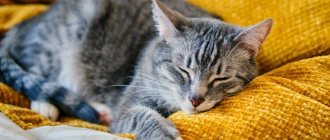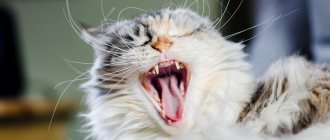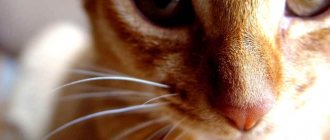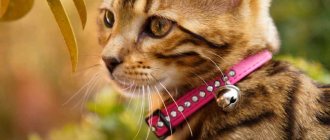11/13/2021 92,465 Diseases and treatment of cats
Author: Olga
When a cat itches or diligently licks itself, this is a completely normal and natural phenomenon. However, animal owners should be wary of their too frequent manifestation, which is accompanied by anxiety and irritability. In this case, often the animal already needs help. Remember that itching is not a disease, but its first symptom, so this manifestation cannot be ignored.
[Hide]
Causes of obsessive licking and gnawing of cats
So, have you noticed that your pet has started scratching, licking and even gnawing itself frequently? This is a clear sign that your cat either has parasites or there are other causes of itching and irritation. The cat will not just constantly lick and scratch himself; this is a defensive reaction to the fact that something is bothering him. Let's consider all possible causes and signs.
Fleas
This is perhaps the most common reason that a cat scratches and licks itself all the time, especially in the area above the tail and on the paws. These parasites can even appear in pets, so no one is safe from them. At the same time, if you do not see small black dots on your cat’s fur, this does not mean that there are no fleas. They can still be very tiny (nits) or simply in the form of eggs on the fur. However, their vital activity will already cause enormous inconvenience and discomfort to the pet.
Other parasites
In addition to fleas, your cat may develop other skin parasites that can cause anxiety and discomfort. The pet will also itch and lick itself a lot. A clear sign of the presence of any parasites is if the cat tries to gnaw something out of its fur. The animal intuitively tries to remove annoying enemies in this way. The most common of them are lice and ticks, which in turn are also dangerous because they carry infections and viruses.
Allergy
If you regularly treat your cat's fur for parasites and the veterinarian's analysis does not show their presence, the cause of the itching may be an allergy. Pedigree cats and cats suffer from it especially often. This may be, like in humans, a manifestation of sensitivity to food, furniture upholstery, or some chemical component. A particularly clear sign of an allergy is when a cat licks itself heavily, thus trying to scratch its nose and lips.
Allergies can be not only to food components, but also seasonal or, for example, to dust and pollen. It is important to get tested and identify the irritating allergen as soon as possible.
Bacteria and fungi
Various microflora live on the skin and in the body of any even healthy animal. But if the cat’s body is weakened, experiencing some kind of stress, lack of vitamins, etc., this can cause an increase in the amount of pathogenic microflora. Because of this, various types of skin inflammation, rashes, itching occur, and the pet’s general condition worsens. Most often, the cause of this phenomenon lies in bacteria and all kinds of fungi. By the way, they can also be transmitted through human hands, because the cat constantly licks itself.
Skin diseases
As a rule, they are all infectious in nature and occur after a pet comes into contact with an infected object. Sometimes it is enough for a cat to go outside just once to pick up some kind of infection. Often, diseases such as pyodermatitis, cheyletiellosis, demodicosis, and scabies occur. They are also caused by mites that parasitize the upper and deep layers of the skin. Severe itching in the first stages very quickly develops into general skin damage and baldness.
If a cat's skin problems are detected, the cat owner needs to thoroughly wash their hands with soap and maintain personal hygiene, since many viruses and bacteria can be transmitted to human hands.
Hormonal disorders
Another of the many reasons why your pet is scratching and licking excessively. As a rule, the cat may experience symptoms of all the previously described causes, for example, baldness, itching, urticaria, and so on. But this is not always due to parasites or diseases. This reaction can be caused by endocrine disruptions, which must be correctly determined by a veterinarian. A therapeutic diet and corrective therapy are prescribed.
Diagnosis of itching in the clinic
There is a certain diagnostic algorithm if a cat’s skin begins to peel, hair falls out, and other dermatological symptoms are observed - it itches, licks:
- Anamnesis collection. The owner provides information about the cat’s breed and age, nutritional habits, and preventive treatments.
- Itching analysis. The doctor determines whether the skin is itchy all over the body or in certain places. Equally important is the frequency and frequency of symptoms.
- Scrapings from places where the kitten itches most often. It is carried out to determine bacterial and fungal infections.
- Analysis for the presence of skin and subcutaneous parasites.
- Examination of the ears for otitis media, ear mites or seborrhea.
- Elimination diet to identify allergens.
- Exclusion of atopic and other types of allergies in cats.
After the diagnosis is made, treatment for the cause itself is prescribed. Elimination of itching is a secondary focus, so the cat may continue to itch during treatment.
Treatment
If you notice that your cat is constantly itching, licking itself, and at the same time acting restlessly, hitting its tail, you should immediately take your pet to the veterinarian. It is better not to try to establish the cause and diagnosis yourself, since many of the symptoms are similar to each other. Laboratory analysis and proper examination will be required.
If the reason that the cat is constantly itching, licking and licking itself lies in fleas and other skin and fur parasites, then external treatment is prescribed. The veterinarian may prescribe special drops or sprays, or recommend treating the animal with medicated shampoo. As a rule, using all these drugs several times helps to quickly remove itching and irritation and overcome parasites. In the future, only timely prevention will be required.
If the skin ailment is caused by an infection or fungus, medicinal sprays and drops will also help in the early stages. But, as practice shows, special medications and antibiotics may still be required. If the cat is constantly itching, licking its face, scratching its ears and eyes, antihistamines are prescribed. An accurate analysis is performed and the source of the allergy is determined.
Prevention measures
The appearance of itching in cats is provoked by a large number of factors. Some preventive measures can minimize most of them:
- Regularly carry out anthelmintic treatment. Preventing worms 3-4 times a year will protect the animal and people who come into contact with it. For the same reason, raw meat, fish and other animal products are excluded from the cat’s diet.
- Minimize stressful situations for the animal.
- Examine the cat for wounds and abrasions after visiting the street. And if they are found, disinfect them.
- If you need to change food, do it gradually.
- Minimize contact with other animals. It is through contact that infection with skin and subcutaneous parasites occurs.
- Wash your cat's litter box regularly and disinfect it.
If your cat itches until it hurts, then this is a reason to contact a veterinarian. Timely treatment of the animal will relieve it from annoying itching and the risk of complications.











